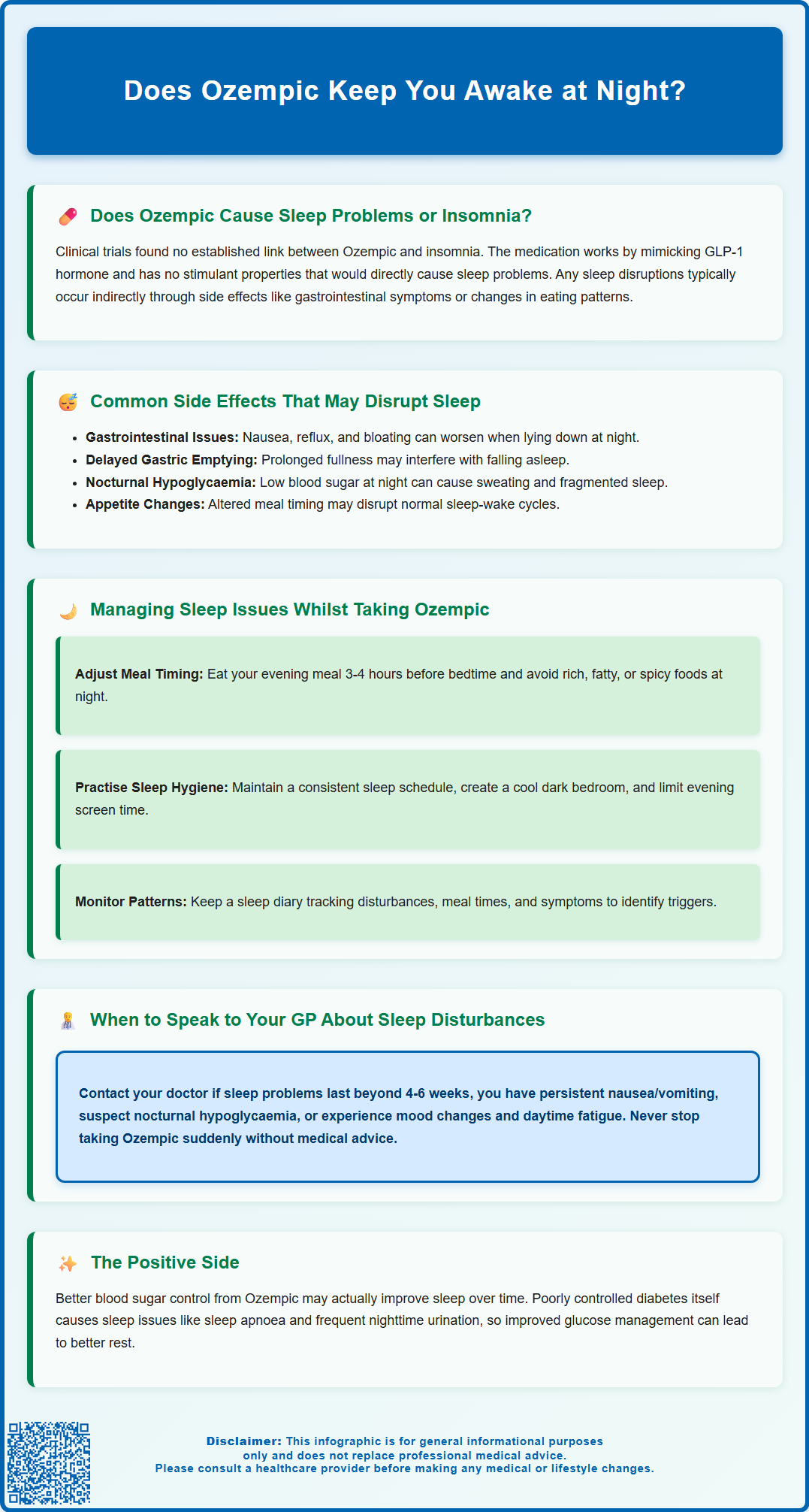Does Ozempic keep you awake at night? Many patients taking Ozempic (semaglutide) for type 2 diabetes wonder whether this medication affects their sleep. Whilst insomnia is not listed as a recognised side effect in clinical trials or the UK Summary of Product Characteristics, some individuals report sleep disturbances during treatment. These issues are typically linked to indirect effects such as gastrointestinal symptoms, altered eating patterns, or nocturnal hypoglycaemia rather than a direct pharmacological action. Understanding the potential mechanisms and management strategies can help you maintain both effective diabetes control and good sleep quality.
Summary: Ozempic does not directly cause insomnia, but some patients experience sleep disturbances due to indirect effects such as gastrointestinal symptoms or nocturnal hypoglycaemia.
- Ozempic (semaglutide) is a GLP-1 receptor agonist licensed in the UK for type 2 diabetes mellitus treatment.
- Clinical trials did not identify sleep disturbances as a frequent adverse reaction to semaglutide.
- Gastrointestinal side effects including nausea, reflux, and abdominal discomfort may indirectly disrupt sleep quality.
- Nocturnal hypoglycaemia risk increases when Ozempic is combined with insulin or sulphonylureas, potentially causing night-time awakenings.
- Adjusting meal timing, maintaining good sleep hygiene, and monitoring blood glucose levels can help manage sleep issues.
- Persistent sleep disturbances beyond 4–6 weeks or severe symptoms warrant medical review and possible dose adjustment.
Table of Contents
Does Ozempic Cause Sleep Problems or Insomnia?
Ozempic (semaglutide) is a glucagon-like peptide-1 (GLP-1) receptor agonist licensed in the UK for the treatment of type 2 diabetes mellitus. Semaglutide is also available at a higher dose (2.4 mg) as Wegovy for weight management, but Ozempic itself is not licensed for weight loss in the UK. Whilst sleep disturbances are not listed as adverse reactions in the Ozempic Summary of Product Characteristics (SmPC), some patients report experiencing difficulties with sleep whilst taking this medication.
There is no established link between Ozempic and insomnia in clinical trials. The SUSTAIN clinical programme, which evaluated semaglutide's efficacy and safety, did not identify sleep disturbances as a frequent adverse reaction. However, individual patient experiences can vary, and several indirect mechanisms may contribute to sleep disruption in some people.
It is important to distinguish between a direct pharmacological effect and secondary consequences of treatment. Ozempic works by mimicking the incretin hormone GLP-1, which enhances glucose-dependent insulin secretion, suppresses glucagon release, and slows gastric emptying. These actions improve glycaemic control and promote satiety. Whilst the drug itself does not have stimulant properties, the physiological changes it induces—such as gastrointestinal symptoms or alterations in eating patterns—may indirectly influence sleep quality in some individuals.
Patients concerned about sleep changes should consider whether these issues began after starting Ozempic and discuss them with their healthcare provider. A thorough assessment can help determine whether the medication, an underlying condition, or other factors are contributing to sleep difficulties.
If you experience any side effects, including sleep disturbances, you can report them via the MHRA Yellow Card scheme.

Common Side Effects That May Disrupt Sleep
Several recognised adverse effects of Ozempic may indirectly interfere with sleep quality, even though insomnia itself is not listed as a side effect in the SmPC. Understanding these can help patients and clinicians identify potential causes of nocturnal disturbance.
Gastrointestinal symptoms are amongst the most frequently reported adverse effects of semaglutide. According to the SmPC, these include:
-
Nausea – very common (may affect more than 1 in 10 people)
-
Vomiting – common (may affect up to 1 in 10 people)
-
Abdominal pain and discomfort
-
Diarrhoea or constipation
-
Dyspepsia and reflux
These symptoms can be particularly troublesome at night, especially if the evening meal is consumed close to bedtime. The delayed gastric emptying caused by Ozempic may lead to prolonged feelings of fullness, bloating, or reflux when lying down, all of which can disrupt sleep onset or cause nocturnal awakenings.
Hypoglycaemia risk is primarily increased when Ozempic is used in combination with insulin or sulphonylureas. Nocturnal hypoglycaemia may cause sweating, palpitations, or vivid dreams, leading to fragmented sleep or early morning awakening. If you take these medications together, your doctor may need to reduce the doses of insulin or sulphonylureas to reduce this risk.
Changes in appetite and eating patterns may also play a role. Some patients experience reduced appetite and altered meal timing, which might affect sleep-wake cycles.
It's important to stay well-hydrated, particularly if you experience vomiting or diarrhoea, as dehydration can worsen how you feel and potentially affect sleep. If you're unable to keep fluids down, contact your healthcare provider promptly.
Managing Sleep Issues While Taking Ozempic
If you are experiencing sleep disturbances whilst taking Ozempic, several practical strategies may help improve your sleep quality without necessarily discontinuing the medication.
Consider your dosing schedule and meal timing. Ozempic is administered once weekly via subcutaneous injection. According to the SmPC, you should take it on the same day each week, though the day can be changed if necessary as long as the last dose was given at least 3 days earlier. If gastrointestinal symptoms are problematic at night, consider:
-
Eating your evening meal at least 3–4 hours before bedtime
-
Consuming smaller, more frequent meals throughout the day
-
Avoiding rich, fatty, or spicy foods in the evening, which may exacerbate reflux or nausea
Address gastrointestinal side effects proactively. The Ozempic SmPC recommends starting at a low dose (0.25 mg weekly for 4 weeks) and gradually titrating upwards to minimise adverse effects. If nausea or reflux is disrupting sleep, speak to your GP about:
-
Temporarily maintaining a lower dose
-
Elevating the head of your bed to reduce reflux symptoms
-
Whether additional medications might be appropriate to manage symptoms
Maintain good sleep hygiene practices, which are beneficial regardless of medication use:
-
Establish a consistent sleep-wake schedule
-
Create a cool, dark, and quiet sleeping environment
-
Limit screen time and stimulating activities before bed
-
Avoid caffeine and alcohol in the evening
-
Engage in regular physical activity, but not close to bedtime
Monitor your blood glucose levels, particularly if you are taking Ozempic alongside insulin or sulphonylureas. If nocturnal hypoglycaemia is suspected, your GP may need to adjust your treatment regimen. Keep a sleep diary noting when disturbances occur, along with details of meals, injection timing, and any symptoms—this information can be invaluable during consultations.
Consider the broader context of your diabetes management. Improved glycaemic control may influence sleep patterns, as poorly controlled diabetes is itself associated with sleep disturbances, including sleep apnoea and nocturia.
When to Speak to Your GP About Sleep Disturbances
Whilst mild, transient sleep disruption during the initial weeks of Ozempic treatment may resolve as your body adjusts to the medication, certain situations warrant medical review.
Contact your GP or diabetes specialist nurse if:
-
Sleep disturbances persist beyond 4–6 weeks despite implementing sleep hygiene measures
-
You experience persistent gastrointestinal symptoms that significantly impair your quality of life
-
You suspect nocturnal hypoglycaemia (symptoms include night sweats, nightmares, morning headaches, or waking feeling confused)
-
Sleep problems are accompanied by mood changes, significant fatigue, or difficulty functioning during the day
-
You develop persistent vomiting or diarrhoea that could lead to dehydration
Seek urgent medical attention (call 111 or attend A&E) if you experience:
-
Severe, persistent abdominal pain which may radiate to your back (possible sign of pancreatitis)
-
Severe abdominal pain with nausea and vomiting (possible gallbladder problems)
-
Signs of severe dehydration (extreme thirst, dry mouth, little or no urination, weakness)
Call 999 immediately if you experience:
-
Severe chest pain
-
Difficulty breathing
-
Symptoms of severe hypoglycaemia that you cannot manage yourself
Your healthcare provider may:
-
Review your current dose and consider adjusting the titration schedule
-
Assess for other potential causes of sleep disturbance, including obstructive sleep apnoea (more common in people with type 2 diabetes and obesity)
-
Evaluate your overall diabetes management plan and consider whether other medications need adjustment
-
Screen for depression or anxiety, which are more prevalent in people with diabetes and can significantly affect sleep
-
Refer you for specialist sleep assessment if appropriate
Do not stop taking Ozempic abruptly without medical advice, as this may lead to deterioration in your glycaemic control. If side effects are intolerable, your GP can discuss alternative treatment options, including other GLP-1 receptor agonists, which may have different tolerability profiles, or entirely different classes of diabetes medications.
It is worth noting that the benefits of Ozempic in type 2 diabetes—improved HbA1c and, in patients with established cardiovascular disease, potential cardiovascular benefits shown in clinical trials—are significant. Many side effects, including those that may indirectly affect sleep, tend to diminish over time. A collaborative approach with your healthcare team can help balance therapeutic benefits with quality of life, ensuring that your diabetes management plan is both effective and sustainable.
Remember to report any suspected side effects to the MHRA through the Yellow Card Scheme.
Frequently Asked Questions
Can Ozempic cause insomnia or keep you awake at night?
Ozempic does not directly cause insomnia, and sleep disturbances were not identified as a frequent side effect in clinical trials. However, some patients report sleep difficulties due to indirect effects such as nausea, reflux, or changes in eating patterns that can disrupt rest when lying down at night.
Why do I feel nauseous at night after starting Ozempic?
Ozempic slows gastric emptying, which can cause prolonged feelings of fullness, nausea, or reflux, especially if you eat close to bedtime. Eating your evening meal at least 3–4 hours before bed and avoiding rich or fatty foods in the evening may help reduce these symptoms.
What's the difference between Ozempic and Wegovy for sleep side effects?
Both Ozempic and Wegovy contain semaglutide, but Wegovy is licensed at a higher dose (2.4 mg) for weight management whilst Ozempic is for type 2 diabetes. The side effect profiles are similar, though higher doses may increase the likelihood of gastrointestinal symptoms that could indirectly affect sleep quality.
Can taking Ozempic with insulin cause night sweats or disturbed sleep?
Yes, combining Ozempic with insulin or sulphonylureas increases the risk of nocturnal hypoglycaemia, which can cause night sweats, vivid dreams, or early morning awakeening. Your doctor may need to reduce your insulin or sulphonylurea dose to minimise this risk.
How long does it take for Ozempic side effects affecting sleep to go away?
Most gastrointestinal side effects that may disrupt sleep tend to improve within 4–6 weeks as your body adjusts to Ozempic. If sleep disturbances persist beyond this period despite good sleep hygiene, you should discuss this with your GP or diabetes specialist nurse.
Should I stop taking Ozempic if it's affecting my sleep?
Do not stop taking Ozempic without medical advice, as this may worsen your blood sugar control. Speak to your GP first—they can adjust your dose, suggest strategies to manage side effects, or discuss alternative diabetes medications if the sleep disruption is severe.
The health-related content published on this site is based on credible scientific sources and is periodically reviewed to ensure accuracy and relevance. Although we aim to reflect the most current medical knowledge, the material is meant for general education and awareness only.
The information on this site is not a substitute for professional medical advice. For any health concerns, please speak with a qualified medical professional. By using this information, you acknowledge responsibility for any decisions made and understand we are not liable for any consequences that may result.
Heading 1
Heading 2
Heading 3
Heading 4
Heading 5
Heading 6
Lorem ipsum dolor sit amet, consectetur adipiscing elit, sed do eiusmod tempor incididunt ut labore et dolore magna aliqua. Ut enim ad minim veniam, quis nostrud exercitation ullamco laboris nisi ut aliquip ex ea commodo consequat. Duis aute irure dolor in reprehenderit in voluptate velit esse cillum dolore eu fugiat nulla pariatur.
Block quote
Ordered list
- Item 1
- Item 2
- Item 3
Unordered list
- Item A
- Item B
- Item C
Bold text
Emphasis
Superscript
Subscript












